Search Results for: Salsa music
We bring trombonist Félix O. Rodriguez from Santurce to ISM
The beautiful island of enchantment Puerto Rico has always given birth to many of the best salsa exponents of all time and the source of talent that has come out of that place has been inexhaustible. It is always a pleasure to be able to talk with a boricua of those who continue to leave their Latin heritage on high and, this time, it was the turn of the arranger, composer, sound engineer and trombonist Félix O. Rodríguez from Santurce.
It was very kind of the artist to give us a few minutes of his time to answer some questions for International Salsa Magazine and then we will be elaborating a bit on the topics we discussed with the salsa exponent.
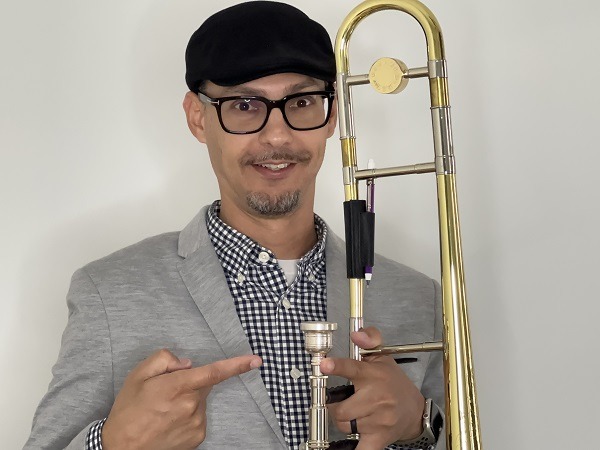
Félix’s beginnings in the music world
Félix’s first contact with music was at home, as his parents listened a lot to salsa, merengue, bachata and Latin music in general. While listening to this music, one of the things that attracted him the most was the sound of the trombone, especially in artists such as Willie Colón, Oscar D’ León, Gilberto Santa Rosa and many others.
Once he reached the seventh grade in school, he decided to take music lessons and chose that instrument to start his training due to his fascination with it, something that today he does not complain about because he assures that he has done very well.
In this learning process, noticing Félix’s interest in the trombone, his father, who was a professional orchestra musician, invited him to rehearsals so that he could soak up this whole atmosphere from an early age. It just so happened that the trombonist of this orchestra could not attend a rehearsal, so they gave the opportunity to the young boy to take his place for that night.
After two or three shows, Félix was selected as house trombonist when he was only thirteen years old. Although he was not old enough to enter nightclubs, he was allowed to be present because he was part of the orchestra that would play there.
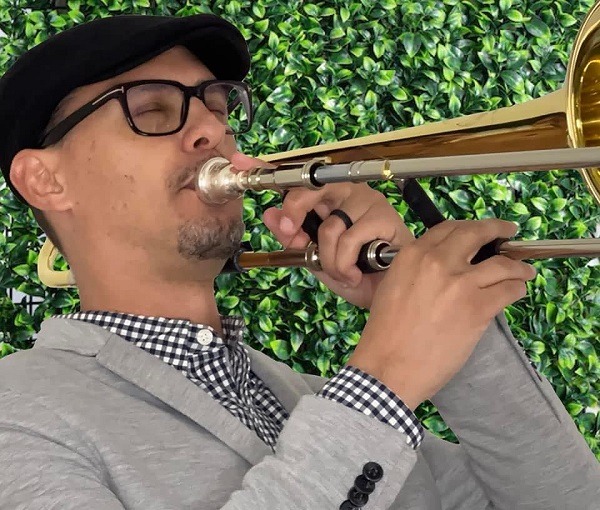
Orquesta Innovación and musical arrangements
When he entered high school, Félix began to study a bit about music theory and related topics such as chords, writing for a specific instrument, percussion and other subjects.
The young man worked so hard to train that, at only 15 years old, he was already perfectly capable of making musical arrangements, starting with transcriptions of music existing so far and copying notes from those songs. After several years on it, he finally started writing his own original music.
In fact, he went on to record a couple of songs with Orquesta Innovación (the second orchestra he was in), a couple of original songs that unfortunately were never released, but served as experience for what would follow.
University of South Carolina
Félix acknowledged with laughter that this was the only university he applied to, so it was almost an obligation for him to be admitted. Fortunately for him, it was.
He had to perform some tests with instruments and show examples of material of his own authorship to prove his musical skills. Everything he had learned so far was mostly based on salsa.
Thanks to his effort and dedication in previous years, he was admitted to the University of South Carolina, where he studied music theory and trombone for five years. While there, the musician learned everything necessary about the historical aspects of all variants of classical music, jazz, marching band, orchestral symphony and many more.
The formation obtained in his studies is still useful to Félix in the arrangements he makes today. However, he made it clear that his passion was and still is salsa and Latin music in general.
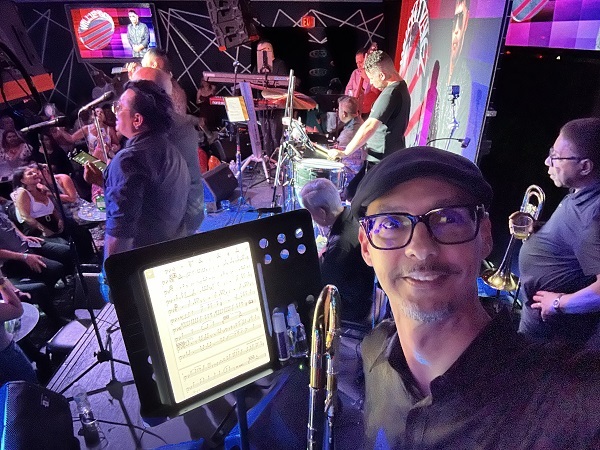
Military life and musical activities during those years
Upon graduating from the university, Félix was commissioned as an officer in the U.S. Army, following his father’s example, who was perfectly capable of meeting his obligations in the military and continuing to exercise his passion for music without having to give up either.
As fate would have it, the artist met up with a former colleague from Orquesta Innovación, which led them to revive their passion for music and to create Orquesta Ideal, with which he spent eight years at Fort Bragg (U.S. military installation), North Carolina, his first stop as an officer.
Over the years, he was assigned to units in Spain, Germany and Korea. It didn’t matter where he went because there were always Puerto Ricans and Latinos eager to get together to make music, which Felix took advantage of to be in touch with music, whether as a trombonist or a DJ.
When asked if these events in which he was involved in were open to the public, he said yes in most cases, as military bases allowed entry to anyone, but unfortunately that changed with the Twin Tower Bombings on 9/11.
Berklee College of Music
During the last years of his military career, Felix studied production, mixing and remastering at Berklee College of Music in order to go preparing for his return to music once his retirement was official.
In addition to playing the trombone and arranging, the musician also loved production, editing, mixing and mastering, so he wanted to learn much more about all of these areas and thus have more control over his own work.
Given that the Covid-19 pandemic was starting at that time, his hours at the military base where he worked were significantly reduced, which he took full advantage of to dedicate more time to school and continue growing as a professional musician.
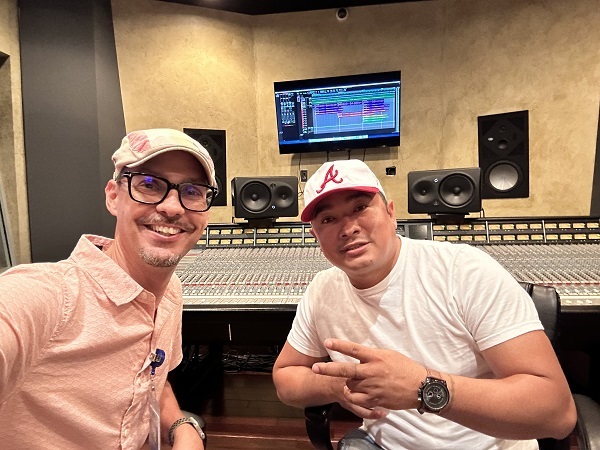
‘‘Con La Música Por Dentro’’
In the year 2021, Felix released his first EP titled ”Con La Música Por Dentro”. In a world still hit by the pandemic, the artist found it very difficult to record and promote his first solo musical work.
He wanted to record with live musicians, but because of this same situation, it was not possible, so there were endless backing vocals he had to do and instruments he had to play himself in order to make the EP happen, so his name is the one that predominates in almost all the credits of the material.
Fortunately, he succeeded to establish a recording studio at home and was supported his friend and singer João José, who recorded voices, piano and bass for the three tracks that make up the EP.
Atlanta
When we wanted to know why he chose Atlanta as his final destination to settle permanently, he told us that he did it to support his wife, who has got a good job in that city. He remembered the time when he started in the army and his wife and daughter always followed him wherever he traveled for his military duties, so he considered that it is time to return everything his partner has done for him and decided to follow her this time.
He had to look a little to meet musicians and re-weave those connections in the industry and the Latino community in Atlanta, so he had to start from scratch in that sense. The good thing is that everything worked out for him and, as soon as he arrived in Atlanta, he was contacted to play with Willie Gonzalez. The bandleader liked his skills as a musician and offered him to continue playing with them, and so it has been to this day.
Read also: Four nationalities united in Ladama
Asia / November 2023
Africa
The Great Pichie Pérez and his brilliant career
There have been many artists who have supported the Spaha Salsa Gallery due to the multiple contributions made to salsa since its foundation. One of them has been the great Pichie Perez, who gave a fabulous interview to the founder and president of the famous salsa museum in New York, Johnny Cruz.
During the video on the Johnny Cruz’s Facebook account, Piche talks about some of the most important aspects of his professional life and, of course, gives his unconditional support to the Spaha Salsa Museum and the labor it has been fulfilling in recent years. Below are some of the most outstanding details of the artist’s life.
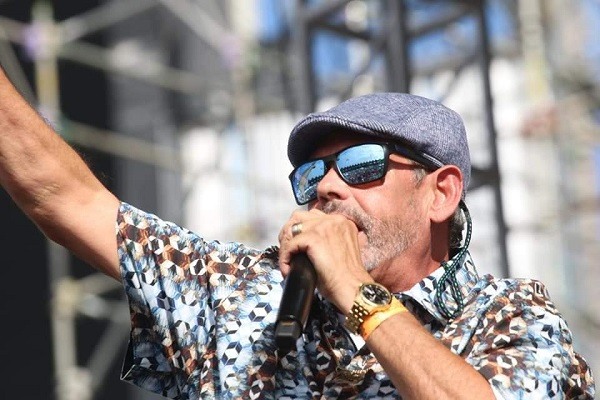
Youth
Héctor ”Pichie” Pérez was born on September 24, 1960 in El Bronx, New York, the youngest of three brothers whose parents were Ramón Pérez Rodríguez and Haydée Casiano González, both of Puerto Rican nationality.
After the age of seven, he moved with his family to Ponce, a place where a genre called bugalú became increasingly popular and the boy’s father enjoyed that kind of music, which made Piche begin to be interested in certain artists, especially Pete Rodríguez with his song ”I Like It Like That”.
At the age of 10, his parents decided to move again, but this time to Cañaboa Encarnación, Peñuelas. Some time later, he became part of what would be the first band of his career, Los Metálicos Steel Band, with which the artist began to gain a lot of knowledge about merengue and calypso. When this same group became a sextet under another name, Pichie started singing and playing maracas and güiro.
Pichie was working in several orchestras that gave him the experience he has today such as the Adolfo Grana school orchestra, Orquesta La Intelectual, Orquesta La Preferida, among others.
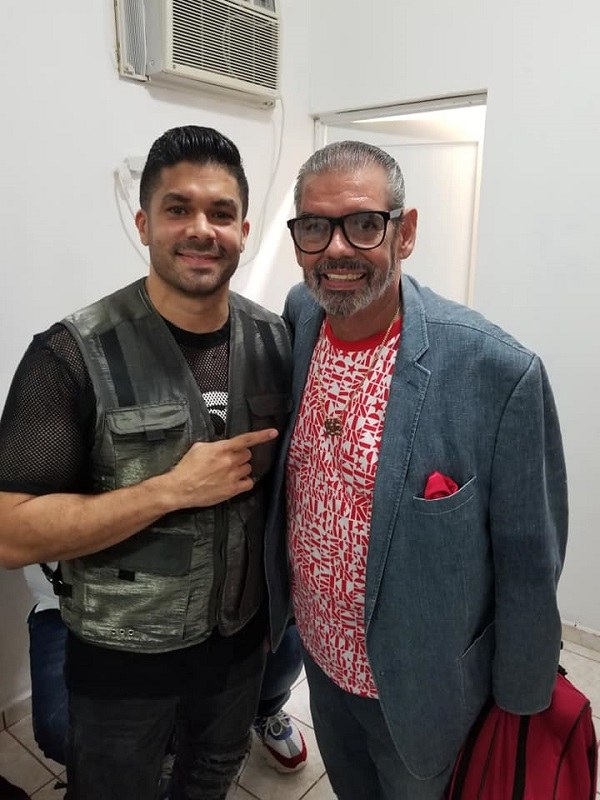
Orquesta La Terrífica and Orquesta La Primerísima
However, his big moment would come when he was part of Orquesta La Terrífica, in which he worked as a vocalist between 1976 and 1981. Additional to this group, Pichie would be in six recordings, among them stands out ”La Terrífica. Sabor a Pueblo”.
Some time later, he would sing in Tommy Valencia’s Orquesta La Primerísima, which would give him the opportunity to share the stage with world famous and acclaimed singer Frankie Ruíz, of whom he cherishes very good memories. Although this is one of the groups for which Pichie would be best known, it was not the last one he was in.
For more than 30 years, he was in La Sonora Ponceña, to which he thanked for all that he achieved and learned during those years. However, there came a point when the singer wanted to make his own way and had to make the tough decision to leave the orchestra and start a solo career, which had ”El Sonero del Bailador” as its starting point in 2016.
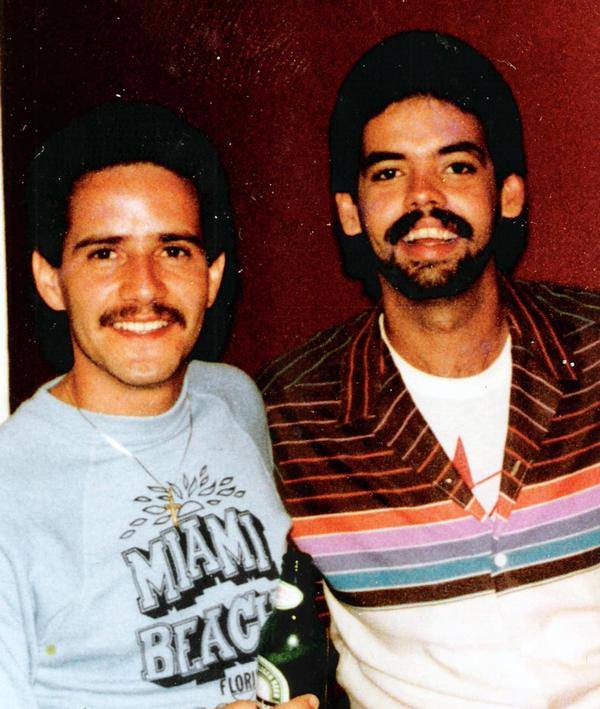
Pichie was expectant before the audience reaction to his solo material, but fortunately, the overall response was very positive, which motivated him to release a new album entitled ”Alegrando La Navidad”.
Nowadays, he has an extraordinary reputation as a solo singer and in orchestral formations, but he also obtained great merits as a güirero and maraquero throughout his artistic career. He also had a great participation as a backing vocalist in many productions and recording sessions to which he added his unique touch.
Read also: Willito and Japhet from La Sonora Ponceña

































